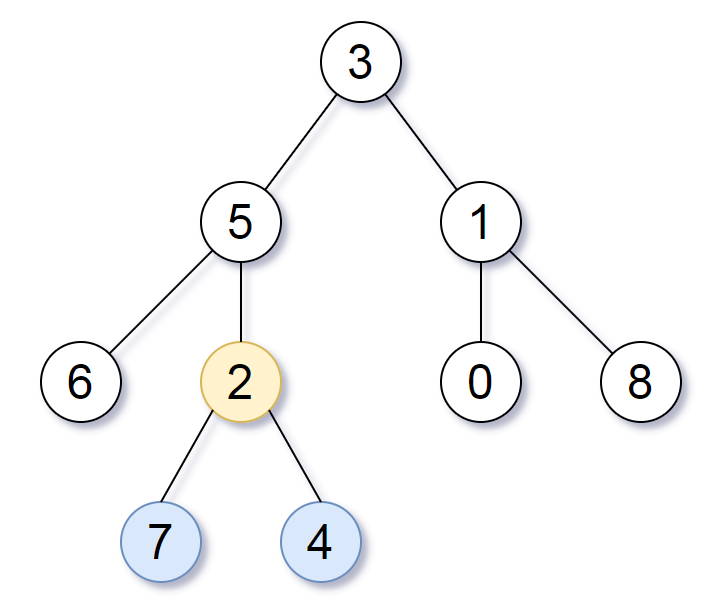Problem
Given the root of a binary tree, the depth of each node is the shortest distance to the root.
Return the smallest subtree such that it contains all the deepest nodes in the original tree.
A node is called the deepest if it has the largest depth possible among any node in the entire tree.
The subtree of a node is a tree consisting of that node, plus the set of all descendants of that node.
Example 1:

Input: root = [3,5,1,6,2,0,8,null,null,7,4]
Output: [2,7,4]
Explanation: We return the node with value 2, colored in yellow in the diagram.
The nodes coloured in blue are the deepest nodes of the tree.
Notice that nodes 5, 3 and 2 contain the deepest nodes in the tree but node 2 is the smallest subtree among them, so we return it.
Example 2:
Input: root = [1]
Output: [1]
Explanation: The root is the deepest node in the tree.
Example 3:
Input: root = [0,1,3,null,2]
Output: [2]
Explanation: The deepest node in the tree is 2, the valid subtrees are the subtrees of nodes 2, 1 and 0 but the subtree of node 2 is the smallest.
Constraints:
The number of nodes in the tree will be in the range
[1, 500].0 <= Node.val <= 500The values of the nodes in the tree are unique.
Note: This question is the same as 1123: https://leetcode.com/problems/lowest-common-ancestor-of-deepest-leaves/
Solution (Java)
/**
* Definition for a binary tree node.
* public class TreeNode {
* int val;
* TreeNode left;
* TreeNode right;
* TreeNode() {}
* TreeNode(int val) { this.val = val; }
* TreeNode(int val, TreeNode left, TreeNode right) {
* this.val = val;
* this.left = left;
* this.right = right;
* }
* }
*/
class Solution {
private int deepLevel = 0;
private TreeNode left = null;
private TreeNode right = null;
public TreeNode subtreeWithAllDeepest(TreeNode root) {
if (root == null || root.left == null && root.right == null) {
return root;
}
deep(root, 0);
if (right == null) {
return left;
} else {
return lca(root, left.val, right.val);
}
}
private TreeNode lca(TreeNode root, int left, int right) {
if (root == null) {
return null;
}
if (root.val == left || root.val == right) {
return root;
}
TreeNode leftLca = lca(root.left, left, right);
TreeNode rightLca = lca(root.right, left, right);
if (leftLca != null && rightLca != null) {
return root;
} else if (leftLca != null) {
return leftLca;
} else {
return rightLca;
}
}
private void deep(TreeNode root, int level) {
if (root == null) {
return;
}
if (deepLevel < level) {
deepLevel = level;
left = root;
right = null;
} else if (deepLevel == level) {
right = root;
}
deep(root.left, level + 1);
deep(root.right, level + 1);
}
}
Explain:
nope.
Complexity:
- Time complexity : O(n).
- Space complexity : O(n).